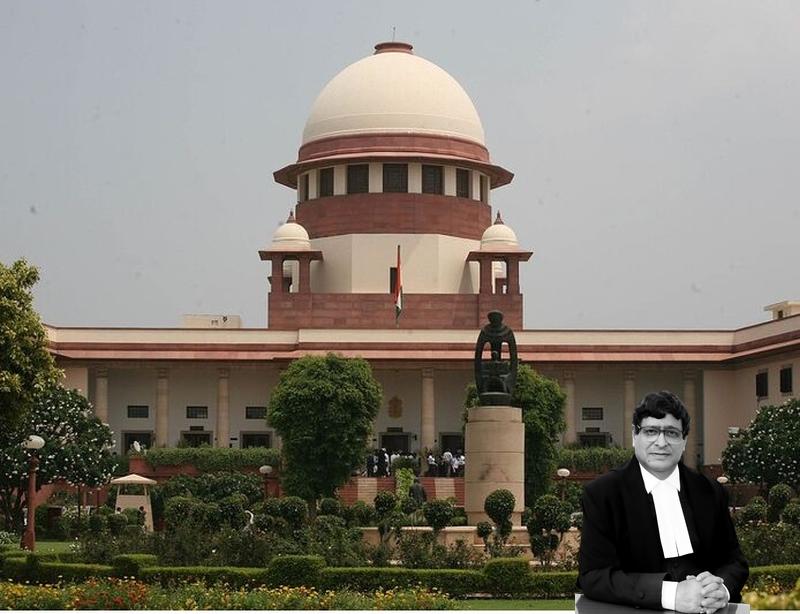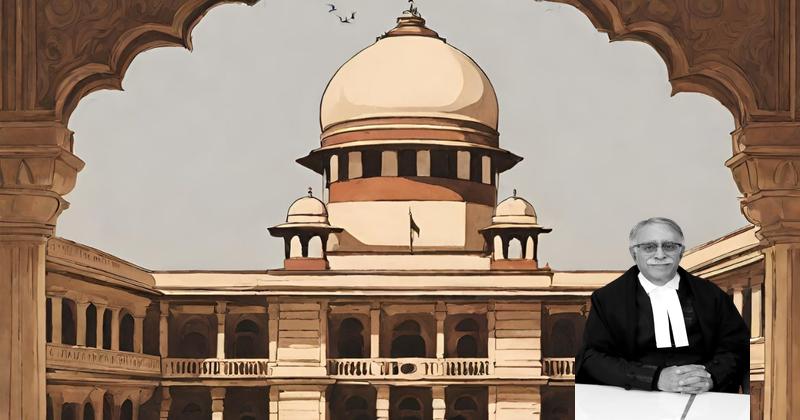5086 OF 2023 (ARISING OUT OF SPECIAL LEAVE PETITION (C) NO(S).17630 OF 2023) @ D.NO.5464 OF 2022 WITH CIVIL APPEAL NO(S).5121 OF 2023 (ARISING OUT OF SPECIAL LEAVE PETITION (C) NO(S).17632 OF 2023) @ D.NO.12813 OF 2022 WITH CIVIL APPEAL NO. 5125 OF 2023 (ARISING OUT OF SPECIAL LEAVE PETITION (C) NO.22923 OF 2022) WITH CIVIL APPEAL NOS.5123-5124/2023 OF 2023 (ARISING OUT OF SPECIAL LEAVE PETITION (C) NOS.21308-21309 OF 2022) Leave granted.
Also Read: https://newslaw.in/supreme-court/selection-and-appointment-of-judicial-officers-in-himachal-pradesh/
Consequently, he filed his petition before the Rajasthan High Court, inter alia, praying that the advertisement dated 11.01.2021 be quashed, as it was in violation of the notification dated 28.06.2018 issued by the NCTE.
They too filed Writ Petitions before the Rajasthan High Court challenging the legality of the notification dated 28.06.2018. The learned counsel would argue that the High Court failed to consider that the notification dated 28.06.2018 was a policy decision taken by the NCTE after the Central Government had issued directions in this regard, under Section 29 of the NCTE Act, and the High Court was wrong in interfering with the policy decision of the Central Government.
They would argue that the Impugned Judgement has been passed ignoring the powers of the Central Government given both under the Act as well as NCTE Act. Elementary education for children is today a Fundamental Right enshrined under Article 21A of Part III of the Constitution of India. The goal set out in Article 45 of the Constitution (as it stood at that time), was to make elementary education free and compulsory for all children up to age of 14 years, within 10 years of the promulgation of the Constitution.
The Standing Committee not only welcomed the amendment but in addition emphasizes on the ‘quality of elementary education’. Education definitely must mean ‘quality’ education and anything less than that should not be called education. Article 21A of the Constitution reads as under: “ Article 21A: The State shall provide free and compulsory education to all children of the age of six to fourteen years in such manner as the State may, by law, determine.” In order to fulfil the above mandate Right to Education Act, 2009, was passed by the Parliament on August 20, 2009, which became effective from 01.04.2010. “The provisions of this Act are intended not only to guarantee right to free and compulsory education to children, but it also envisages imparting of ‘quality’ education by providing required infrastructure and compliance of specified norms and standards in the schools.” [See Para 8, (2012) 6 SCC 1] 19.
Any compromise on the qualification of teachers would necessarily mean a compromise on the ‘quality’ of education. (2) Where a State does not have adequate institutions offering courses or training in teacher education, or teachers possessing minimum qualifications as laid down under sub-section (1) are not available in sufficient numbers, the Central Government may, if its deems necessary, by notification, relax the minimum qualifications required for appointment as a teacher, for such period, not exceeding five years, as may be specified in that notification: Provided that a teacher who, at the commencement of this Act, does not possess minimum qualifications as laid down under sub-section (1), shall acquire such minimum qualifications within a period of five years: The ‘ Academic Authority’ under Section 23(1) of the Act is the National Council for Teachers Education (NCTE), which brought a notification on 23.08.2010, laying down the necessary qualifications for teachers, both at primary, as well as upper primary level. Later this notification was amended, but B.Ed. It is for this reason that the qualification which was prescribed for a teacher in primary school was a diploma in elementary education (D.El.Ed.), and not any other educational qualification, including B.Ed.
Curriculum and evaluation procedure.— (1) The curriculum and the evaluation procedure for elementary education shall be laid down by an academic authority to be specified by the appropriate Government, by notification. (2) The academic authority, while laying down the curriculum and the evaluation procedure under sub-section (1), shall take into consideration the following, namely:— (a) conformity with the values enshrined in the Constitution; (b) all round development of the child; (c) building up child’s knowledge, potentiality and talent; (d) development of physical and mental abilities to the fullest extent; (e) learning through activities, discovery and exploration in a child friendly and child- centered manner; (f) medium of instructions shall, as far as practicable, be in child’s mother tongue; (g) making the child free of fear, trauma and anxiety and helping the child to express views freely; (h) comprehensive and continuous evaluation of child’s understanding of knowledge and his or her ability to apply the same.” As we can see the curriculum and evaluation procedure which the ‘ Academic Authority’ is mandated to set up requires a pedagogical approach which can be best given by teachers who are trained to deal with child students.
In order to appreciate the difference between Diploma in Elementary Education (it is called by different names in each State), and Bachelor of Education (B.Ed.), we look no further than the Notifications issued by National Council for Teacher Education (NCTE) itself from time to time. candidates for primary classes is in the teeth of several decisions of this Court, as this Court has consistently held that Diploma in elementary education (D.El.Ed.) and not B.Ed. On the other hand, the curriculum is of a generic nature and deals with subjects like the principle of educational-curriculum studies, educational psychology, development of education in modern India, social organization and instructional methods, etc.” Then again in Para 10 it was stated as under: “…………For teaching in the primary school, therefore, one must know the child psychology and development of a child at a tender age. B.Ed.) was even higher than the Diploma in Elementary Education (D.El.Ed.) which was held by the other candidates. is a well-recognized qualification in the field of teaching, yet it is a training which equips a candidate to teach higher classes, not classes at primary level. The pedagogical skills and training required from a teacher at Primary level is not expected from a B.Ed.
This was during the initial period starting from the year 2010 onwards, when the Act and the subsequent order of NCTE laid down the qualifications for Primary School Teachers throughout the country. courses (for primary classes), is well recognised, and it is for this reason that in the impugned notification itself it is provided that B.Ed. It is not to impart ‘quality’ education, but to provide more job avenues to B.Ed. 61-03/20/2010/NCTE/(N&S), dated the 23rd August, 2010 published in the Gazette of India, Extraordinary, Part III, Section 4, dated the 25th August, 2010 hereinafter referred to as the said notification namely:- (1) In the said notification, in para 1 in sub-para (i), in clause (a) after the words and brackets “Graduation and two year Diploma in Elementary Education (by whatever name known), the following shall be inserted, namely:- OR “Graduation with at least 50% marks and Bachelor of Education (B.Ed.)” as a qualification was apparently triggered by a letter of the Commissioner of KVS, who made a request requested that since in the Primary classes of Central Schools sufficient number of trained Diploma holders are not available, they may be permitted to appoint B.Ed.
These communications culminate in a letter dated 30.05.2018 issued by the Ministry of Human Resource Development, which was in the form of a direction issued under Section 29 of the NCTE Act which required NCTE to amend the eligibility criteria to include B.Ed. Further, HRM has also directed that NCTE may amend the qualification and make B.A./B.Sc., B.Ed. In addition to above, NCTE will roll out four year B.Ed. integrated course from next academic year, therefore, the prevalent D.El.Ed./B.Ed. Section 29 of the NCTE Act is as follows: (1) The Council shall in the discharge of its functions and duties under this Act be bound by such directions on questions of policy as the Central Government may give in writing to it from time to time. The meeting clearly took the decision that in view of the facts presented by the Commissioner, KV and since the NCTE did not have any objection to permit KV schools to recruit primary teachers with higher qualifications, then there should be no objection to extending this to other schools, and therefore, this Ministry could issue directions to the NCTE under Section 29.” Letter dated 30.05.2018 from the Government to NCTE. Further, in view of the facts presented by the Commissioner, KV and since the NCTE did not have any objection to permit KV schools to recruit primary teachers with higher qualifications, then there should be no objection to extending this to other schools.
Therefore, considering the powers vested in MHRD under Section 29 of the NCTE Act, 1993, the NCTE Regulation 25.08.2010 (Determining qualification of teacher to be appointed at primary level Classes 1 to 5 ) shall be amended to include that any person who has acquired the qualification of B.Ed. qualified candidates are better suited for appointment as teachers in Primary schools, as they have ‘higher qualifications’, and as such they should be appointed as teachers in all Primary schools. is not a qualification for teaching at Primary level of classes, much less a better or higher qualification, in context of Primary classes. When Diploma in elementary education (D.El.Ed.), was placed as an essential qualification for teachers in Primary school, it was with a purpose, and the purpose was to declare only such teachers as qualified who are trained to impart education to children at ‘primary level’. A teacher must be trained to teach students at “primary level”, and this is precisely what the training of Diploma in elementary education (D.El.Ed.) does; it trains a person to teach children at primary level. It is to cover this defect, that all such candidates, must undergo a mandatory six months Bridge Course in elementary education!
The Rajasthan High Court by way of the Impugned Judgement had rightly struck down the notification dated 28.06.2018, on the following grounds:- “(i)
The impugned notification dated 28.06.2018 is unlawful because: – (a) it is under the direction of the Central Government, which power the Central Government under Subsection (1) of Section 23 of the RTE Act did not have; and (b) it is not in exercise of power of the Central Government under Sub-section (2) of Section 23 of RTE Act relaxing the eligibility criteria prescribed by the NCTE, nor there has been any exercise for ascertaining existence of the conditions precedent for exercising such power. (iv) The State Government could not have ignored the notification of NCTE dated 28.06.2018 while issuing advertisement for REET. —
For the purpose of maintaining standards of education in schools, the Council may, by regulations, determine the qualifications of persons for being recruited as teachers in any pre-primary, primary, upper primary, secondary, senior secondary or intermediate school or college, by whatever name called, established, run, aided or recognised by the Central Government or a State Government or a local or other authority:
Section 12A only compliments Section 23 of the Right to Education Act, which we have already discussed in the preceding paragraphs. (2) The decision of the Central Government as to whether a question is one of policy or not shall be final.” It was submitted that by a notification dated 28.06.2018, NCTE has only followed the directions of the Central Government which are in the nature of a policy. Section 29 of NCTE Act which mandates that NCTE must follow the directions of the Central Government in discharging of its functions. A policy decision which is totally arbitrary; contrary to the law, or a decision which has been taken without proper application of mind, or in total disregard of relevant factors is liable to be interfered with, as that also is the mandate of law and the Constitution. Union of India [(2003) 4 SCC 289], this Court has already considered the scope of judicial review and has enumerated that where a policy is contrary to law or is in violation of the provisions of the Constitution or is arbitrary or irrational, the courts must perform their constitutional duties by striking it down…”
Certain tests, whether this Court should or not interfere in the policy decisions of the State, as stated in other judgments, can be summed up as: (I) If the policy fails to satisfy the test of reasonableness, it would be unconstitutional.
Case Title: DEVESH SHARMA Vs. UNION OF INDIA (2023 INSC 704)
Case Number: C.A. No.-005068-005068 / 2023



